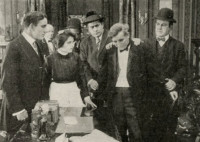Conscience Filming Locations

Where was Conscience filmed? Conscience was filmed in 1 locations across United States in the following places:
Conscience Filming Locations
Conscience (1915)
George Grant has invented a device which is being financed by his partner, John Benson, who receives an offer of $200,000 for the patent rights of the valuable invention. The offer is accepted with Grant's approval. Grant enters a barroom where an old man reprimands Dave Wilson, a young man out of employment, for wasting his time in barrooms. Dave strikes the old man, and Grant interferes, giving the young man a black eye. Benson sees the encounter and Grant returns to his home office with Benson. As Benson is leaving he meets Dave, who tells him he has been persuaded by his mother to apologize to Grant. The apology is accepted. Then Grant suddenly drops dead. Dave hears a police whistle blown outside, and runs into the next room where he crawls under the bed. Policemen and members of Grant's household arrive and discover Grant's body. One of the policemen telephones to the police station, and Detective Doyle is assigned to take charge of the case. Dave is present when Doyle arrives on the scene of the murder, and explains to Doyle how Grant dropped dead. Meanwhile a policeman finds a pistol in the yard, and hands it to Doyle. Benson telephones from his home that he wishes to speak to Grant. Doyle answers that there has been an accident and he had better come over at once. When Benson arrives Dave urges him to tell the detective that Benson knew of Dave's mission to the house, but Benson answers, "I know about the fight, and I know nothing about the apology." Dave collapses and is dragged off to the police station. The scene then shifts to the courtroom where Dave has been tried for murder and the jury have found him guilty. Shortly after Dave is electrocuted. One year later James Sprague, the criminologist, is visiting his old friend, the warden, and is shown the reforms the warden has made in prison life. The warden believes in the golden rule, and between working hours the men are allowed their freedom and are treated as human beings. The prisoners are shown playing baseball, and are given manual exercises. During the game the warden tells Sprague that he is glad capital punishment has been abolished as many an innocent man had been electrocuted. The warden then shows Sprague a photograph of Grant's home, declaring that he doesn't believe that the man who was electrocuted for killing Grant was actually guilty. Sprague is interested in the case, and departs with the photograph in his pocket. We next see Sprague at Grant's home making a close examination of the room in which Grant was killed. He looks out of the window into the yard where he sees a boy in a swing. He chases the boy out of the yard, gets on the swing, and concludes that Grant was shot by the murderer swinging himself to a height on a level with Grant's window which would account for the revolver picked up in the yard subsequent to the murder. Meanwhile Benson's guilty conscience has made him a nervous wreck. He goes to his home, where he has another vision of Grant, and shoots at the specter with his revolver. The servants rush in, and the butler revives him with a stimulating drink. Sprague consults Detective Doyle, who asserts that Grant's murder was a case of murder for revenge, and in his subsequent investigation learns of Benson's strange attack of nervousness. Under the pretense of wanting to make a business contract, Sprague makes the acquaintance of Benson. He bribes the butler and maid servant to get themselves discharged and the next day he installs servants of his own choice in Benson's household. Sprague's wife is engaged as the maid servant. The butler and Sprague's wife, abetted by a detective, act so strangely and get Benson into such an extremely nervous condition that when Sprague calls on him to close the proposed contract he begins to suspect that he is being spied on, especially on being asked whether he is interested in the abolition of capital punishment. Sprague then relates to him the peculiar case of Dave Wilson in connection with the murder of George Grant, which increases Benson's apparent nervousness. Meanwhile, Detective Doyle, who is in the yard, fires off a revolver, at a given signal from Sprague. Benson becomes hysterical and confesses that he committed the murder. At the close of the picture, Benson is seen in prison stripes in order to emphasize that while Dave Wilson had no chance of redemption. Benson, through the abolition of capital punishment, would at least be given a chance.
